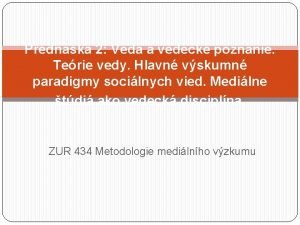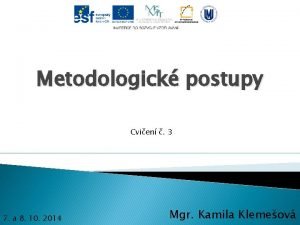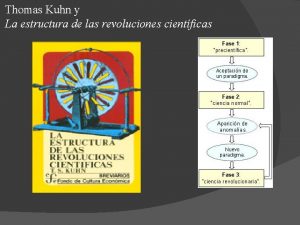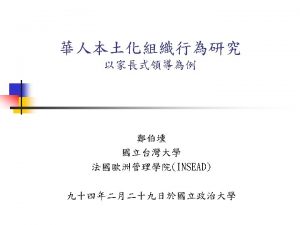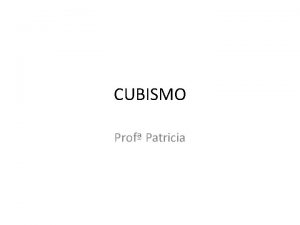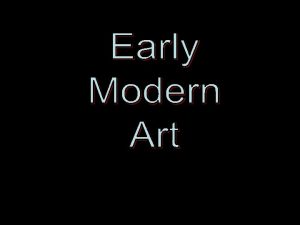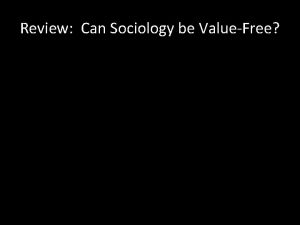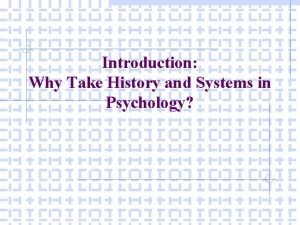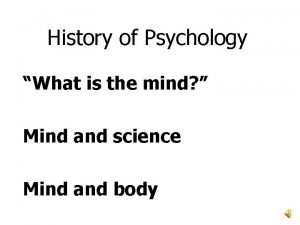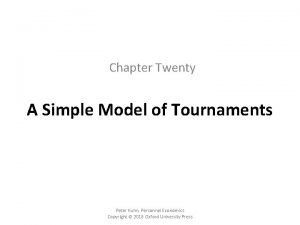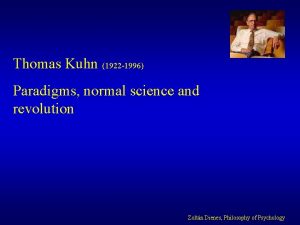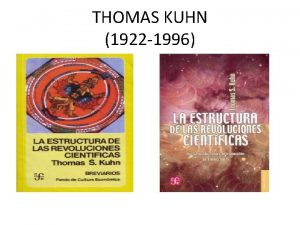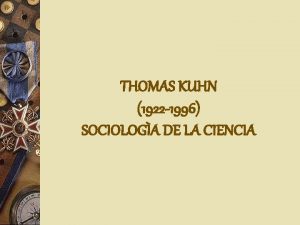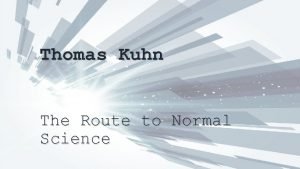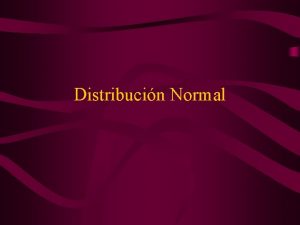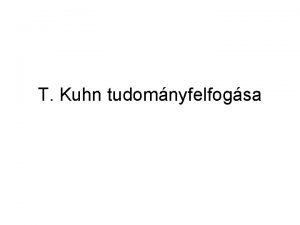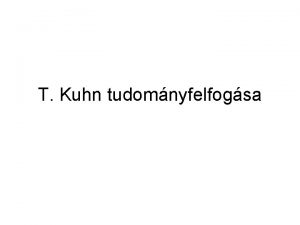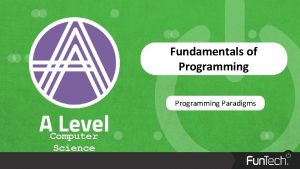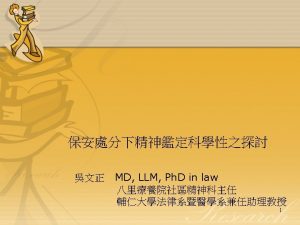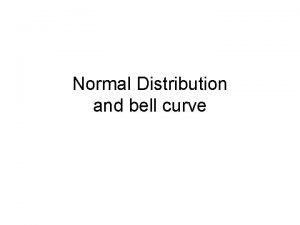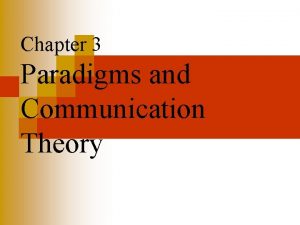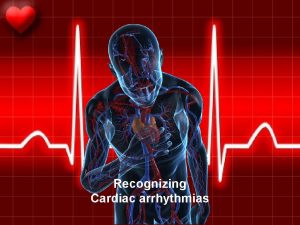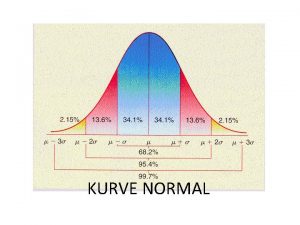Thomas Kuhn 1922 1996 Paradigms normal science and
























- Slides: 24

Thomas Kuhn (1922 -1996) Paradigms, normal science and revolution Zoltán Dienes, Philosophy of Psychology

Paradigm : Narrow definition: Universally recognized scientific achievements that provide model problems and solutions to a community of practitioners. (“Paradigm” is Greek for model, pattern. ) Broad definition: The entire constellation of beliefs, values and techniques shared by members of a scientific community (because they were all trained on the same paradigm examples of good practice) E. g. Newtonian dynamics.

Example in Psychology: Behaviourism: Narrow: An analysis of e. g. dogs salivating to a bell in terns of classical conditioning provides a model problem and solution Broad Beliefs and values include: Theories must only refer to stimuli and responses, not internal states; all learning can be conceptualised as conditioning, etc

Normal science: research firmly based on such a paradigm (the coming of maturity of a science) Pre-normal science: there exists a range of different schools, not united by a common paradigm Normal science: An attempt to force nature into the preformed and rigid box that the paradigm provides. The aim is to stay within the box.

Kuhn: Normal science is puzzle solving. If the puzzle is not solved, the failure reflects on the scientist not on the paradigm. The person who blames the paradigm will be seen as the carpenter who blames his tools. The man who succeeds proves himself an expert puzzle solver, and the challenge of the puzzle is what drives him on. Contrast Popper – experiments test theories not people (What do scientists actually do? Donovan, Laudan and Laudan, 1992)

Kuhn: A common paradigm frees the scientific community from having to constantly re-examine first principles; community is free to concentrate exclusively on the subtlest and most esoteric of phenomena that concern it “To turn Sir Karl’s view on its head, it is precisely the abandonment of critical discourse that marks the transition to a science”

Popper: “The ‘normal’ scientist, as described by Kuhn, has been badly taught. He has been taught in a dogmatic spirit: he is a victim of indoctrination. He has learned a technique which can be applied without asking for the reason why … as a consequence, he has become what may be called an applied scientist, in contradistinction to what I should call a pure scientist. He is … merely content to solve ‘puzzles’. I admit that this kind of attitude exists … But I can only say that I see a very great danger in it and … the possibility of its becoming normal… a danger to science and, indeed, to our civilisation. ”

Kuhn: Failure with a new problem is disappointing but not surprising: problems do not often yield to the first attack. Scientists do not renounce the paradigm. Difficult anomalies can be set aside for future work. (It is OK to provisionally ignore an apparent falsification of your favourite theory!) The scientist who pauses to examine every anomaly he notes will seldom get significant work done.

Are anomalies simply ignored by scientists? Dunbar 1997 Spent a year in four highly productive molecular biology labs: Anomalies, especially those challenging core assumptions, were especially closely attended to and used to generate new hypotheses In 19 th century, Mercury’s orbit was not fully explained by Newton’s theory. A scientist at the time says that no planet had “extracted more pain and trouble” and “awarded [astronomers] with so much anxiety” How do psychologists respond to “anomalies”?

Kuhn: Crisis: build up of anomalies that resist solution. Creates a growing sense that the paradigm has ceased to function adequately in the exploration of nature.

Kuhn: Crisis: build up of anomalies that resist solution. Creates a growing sense that the paradigm has ceased to function adequately in the exploration of nature. Having achieved the status of a paradigm, a scientific theory is declared invalid only if an alternative candidate is available to take its place. “The methodological stereotype of falsification by direct comparison with nature does not exist in actual science” The decision to reject one paradigm is always simultaneously the decision to accept another: a comparison between paradigms occurs. (Do scientist only treat difficulties as acute if there is a rival? See Donovan et al)

Incommensurability between paradigms Kuhn: There is a sense in which work in different paradigms cannot be compared (or are difficult to compare). 1. Disagreement over the list of problems to be solved. “What causes conscious awareness? ” “How fast can mental images be rotated? ” were not legitimate problems for behaviourists. Information processing psychology de-emphasized learning; connectionism brought it back to the fore

2. Disagreement over how to describe basic observations A hypnotherapist might literally see a subject going into trance, while an academic researcher might just see someone relaxing. “Sam is an extrovert” means different things depending on your theory of extroversion and how the extroversion scale was developed

The actual data are different when seen through the lense of different paradigms. Must they necessarily be? Same theory of telescope could be used for providing data to test big bang and steady state cosmology paradigms; Same data on children’s reading errors can be used for testing connectionist and information processing accounts of reading

Kuhn: When two scientific schools disagree about what are the problems what counts as a solution what the data actually are they will talk past each other in debating their respective paradigms. So how can one choose between different paradigms?

Kuhn: Paradigm choice can never be settled by logic and experiment alone. It is an act of faith: Despite all the problems a new paradigm currently has, is it a way of practicing science that is likely to be fruitful in providing solutions to the puzzles it defines? “In paradigm choice there is no standard higher than the assent of the relevant community. ”

Relativism: Different theories are equally true, it’s all relative to what a group believes “In paradigm choice there is no standard higher than the assent of the relevant community. ” So the community could not be mistaken? Does truth lie in power? Does truth change when the community changes its mind?

Need to distinguish: Description of world from world In order that one could be wrong. The fact and the representation of a fact can be different! (If you partner says “I did/did not sleep with your best friend” Is either answer just as true? ) Yet Kuhn says when paradigms change scientists literally live in a different world.

Kuhn inspired (with regret) a domination of relativism in the humanities and social sciences (e. g. post-modernism, science studies, social constructionism) Consider this quote from training material for teachers: “For many centuries it was considered to be a fact that the Sun revolves around the Earth. The appearance of another theory, such as the diurnal rotation of the earth, entailed the replacement of the fact just cited with another: the Earth rotates on its axis each day. ” If facts change when we change what we think, does it matter who we convict for a rape? Can you jump from a plane and fly if you believe you can?

Kuhn: To go between paradigms, cannot be done step by step; it happens all at once like a Gestalt switch. The transfer of allegiance from paradigm to paradigm is a conversion experience. Converting people is difficult. Typically new paradigms are introduced by a person new to the field. Max Planck: “A new scientific truth does not triumph by convincing its opponents and making them see the light, but rather because its opponents eventually die, and a new generation grows up that is familiar with it”. Is that true?

Diamond 1992 Tiny non-significant correlations between actual or professional age of 100 chemists and whether or not they supported the radical theory of polywater Physicists of all ages came to adopt quantum theory and relativity rather than Newtonian dynamics as closer to the truth in a very short period of time.

Kuhn: Revolution: the change of a paradigm in a discipline Revolution is a transformation of vision, crises are terminated not be deliberation but by a gestalt switch. After a revolution the data themselves change and the scientists work in a different world.

Gestalt switch: the data changes (Implications: One way of looking at the data is not more true than another ? One cannot simultaneously consider the data from the point of view of two different theories ? )

Are there objective reasons for why scientists should favour one theory over another? Does science tend to move closer to the truth? Do scientists try to falsify fundamental theories?
 Thomas kuhn elizabeth kuhn
Thomas kuhn elizabeth kuhn Interpretativizmus
Interpretativizmus Postrukturalismus
Postrukturalismus Tudományos forradalmak szerkezete
Tudományos forradalmak szerkezete Ciencia segun thomas kuhn
Ciencia segun thomas kuhn Kuhn social science
Kuhn social science The waste land 1922
The waste land 1922 Interesting facts about 1922
Interesting facts about 1922 Luuletajate sõpruskond 1938
Luuletajate sõpruskond 1938 Facts about christiaan barnard
Facts about christiaan barnard Podemos dizer que o cubismo
Podemos dizer que o cubismo Paul klee senecio 1922
Paul klee senecio 1922 1953-1922
1953-1922 1922-1943
1922-1943 Cadillac 1900
Cadillac 1900 Thomas mocker and thomas stewart
Thomas mocker and thomas stewart What is your favorite subject ?
What is your favorite subject ? Säulen der traumapädagogik
Säulen der traumapädagogik Positivism sociology
Positivism sociology Popper vs kuhn
Popper vs kuhn Principle of falsifiability
Principle of falsifiability Kuhn poker
Kuhn poker Chandlee kuhn
Chandlee kuhn Peter kuhn model
Peter kuhn model Beate kuhn artwork
Beate kuhn artwork

